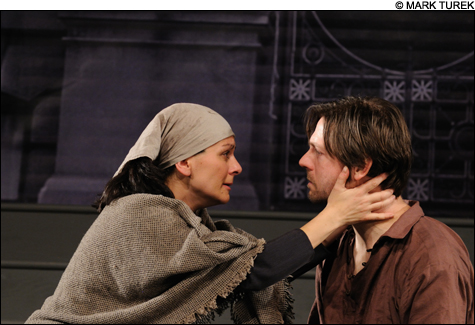
RESTRAINED ANGUISH Brazil and Thorne. |
The Crucible is a profoundly moving story, especially when inhabited by the talents at Trinity Repertory Company. This is the third time the group has taken on Arthur Miller's masterwork of American theater, the last a quarter-century ago. Despite a high-concept staging that distances us from the proceedings, the current outing (through March 13) is still likely to leave you shaken.
As well as being based on the Salem witch trials of the late 17th century, the play serves as an allegory about our more recent witchhunts, when the House Un-American Activities Committee was trying to ferret out Communists from the government and Hollywood. The Crucible was eerily looking forward as well as back, since the 1953 play was a portent of Miller's brief imprisonment three years later for refusing to name names before the committee.
Directed by Brian McEleney, the play is being presented as guerrilla theater by a street troupe in front of Providence City Hall. Eugene Lee's set has a towering black-and-white photograph of the building, with steps before it and a door in the middle.
We meet these Puritans in 1692, when they were surrounded by more than imaginary dangers, between hostile Indians and the wild animals in forest shadows. The witchcraft hysteria was an understandable embodiment of such fears, but that was no comfort to the more than 150 arrested and 19 eventually hanged across northern Massachusetts.
Events begin intensely in this fiction-enhanced account, with the Rev. Samuel Parris (Bob Berky) concerned that his daughter, Betty (John Tracey), seems paralyzed, mute in bed. There has been talk of witches sighted, flying over barns and such. Suspicion falls upon Parris's Barbados slave Tituba (Barbara Meek), whom he saw with his daughter and other girls, dancing in some occult ritual in the woods. A supposed expert in such matters, the Rev. John Hale (Mauro Hantman), is called in to investigate. By the end of Act I, to avoid hanging, Tituba confesses to dealings with the devil and accuses others in the village of witchcraft. Betty and Abigail Williams (Olivia D'Ambrosio), the girl with the strongest personality, frantically join in accusing people.
Not long before, sly Abigail enjoyed a tryst with a now-reluctant John Proctor (Stephen Thorne) and wants to renew their passion. Before long she accuses his wife, Elizabeth (Angela Brazil), of witchcraft in a desperate attempt to take her place. The Proctors' servant, Mary Warren (Rachael Warren), soon affects their fate, accusing John of witchcraft.
Deputy Governor Thomas Danforth (Fred Sullivan Jr.) is brought in to lead the prosecution, and his heavy-handedness alienates even the Rev. Hale, who grows sympathetic to the accused. If there is a weakness to this play, it's that Danforth is one-dimensionally written, his words alone presenting no uncertainty over whether he might change his mind. If Danforth were played as wrongheadedly sincere, though, instead of arrogantly sanctimonious, the character might work better.
Although persecuting people for witchcraft is the primary outrage here, a more insidious one develops. In order to escape hanging, many of the accused make pious confessions, which in this account necessitates also accusing others, the offense that the playwright felt most deeply about.